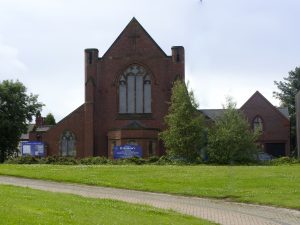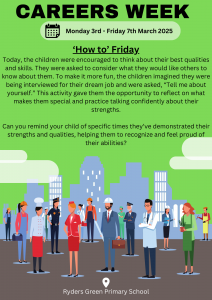
At Ryders Green, we strive to give every child, every opportunity, at their one chance in primary school.
At Ryders Green Primary School, it is our aim to ensure a high-quality history education is delivered across our school to support pupils in gaining a coherent knowledge and understanding of Britain’s past and that of the wider world. It is our aim to inspire and engage our pupils’ curiosity to want to know and explore more about the past. It is fundamental within our practice to teach and equip pupils in gaining the appropriate skills to ask perceptive questions, think critically, discuss the validity of evidence, debate and discuss arguments, as well as develop their own perceptions and judgements alongside their findings.
History at Ryders Green aims to help pupils to understand the complexity of people’s lives, the process of change, the diversity of societies and relationships between different groups, as well as their own identity and the challenges of their time. It is our aim to ensure that children are taught explicitly regarding chronology and the progression of both skills and vocabulary as pupils’ progress throughout their school journey.
We recognise that History now allows pupils to share their learning in creative ways to allow for collaborative learning and an integrated STEM approach to learning. This aims to ultimately provide pupils with the opportunity to fully immerse themselves into their historical content, enabling them to become confident, inspired and skilful historians at the end of KS2.
Early Years Stage
Children will explore a variety of primary & secondary sources and be able to respond and recall information e.g. objects, photos, non-fiction books etc.
Children will:
- Know about the important people in their lives
- Know about people who help us in our community
- Know some similarities and differences between things in the past and now
- Understand how their own behaviour can have an effect on others
Children will understand chronology by:
- They understand change over time:
- Understand and follow a visual timetable for daily routines
- Know things that have happened in the past
- Sequence events and stories with an understanding of chronological order
Key Stage 1
- Changes within living memory. Where appropriate these should be used to reveal aspects of change in national life.
- Events beyond living memory that are significant nationally or globally (e.g., Great fire of London)
- The lives of significant individuals in the past who have contributed to national and international achievements. Some should be used to compare aspects of life in different periods (e.g., Elizabeth I and Queen Victoria, Christopher Columbus and Neil Armstrong, Florence Nightingale)
- Significant historical events, people and places in their own locality
Key Stage 2
- Changes in Britain from Stone Age to the Iron Age
- The Roman Empire and its impact on Britain
- Britain’s settlement by Anglo-Saxons and Scots
- The Viking and Anglo-Saxon struggle for the Kingdom of England to the time of Edward the Confessor
- A local history study
- A study of an aspect or theme in British history that extends pupils’ chronological knowledge beyond 1066
- The achievements of the earliest civilisations – an overview of where and when they first appeared and a depth study of one of the following: Ancient Sumer; The indus Valley; Ancient Egypt; The Shang Dynasty of Ancient China
- Ancient Greece – Greek life and achievements
- A non-European society that provides contrast with British history – chosen from: Islamic civilisation; Study of Bagdad; Mayan civilisations
From the History Ryders Green school policy:
- Enabling children to think as Historians placing emphasis on examining historical artefacts and primary sources
- Opportunity to visit sites of historical significance
- Encourage visitors into school to discuss experiences of past events
- Importance of stories in history as a way of stimulating interest
- Encourage questioning
What are our intentions of the History curriculum at Ryders Green Primary School?
At Ryders Green Primary School, it is our aim to ensure a high-quality history education is delivered across our school to support pupils in gaining a coherent knowledge and understanding of Britain’s past and that of the wider world. It is our aim to inspire and engage our pupils’ curiosity to want to know and explore more about the past. It is fundamental within our practice to teach and equip pupils in gaining the appropriate skills to ask perceptive questions, think critically, discuss the validity of evidence, debate and discuss arguments, as well as develop their own perceptions and judgements alongside their findings.
History at Ryders Green aims to help pupils to understand the complexity of people’s lives, the process of change, the diversity of societies and relationships between different groups, as well as their own identity and the challenges of their time. It is our aim to ensure that children are taught explicitly regarding chronology and the progression of both skills and vocabulary as pupils’ progress throughout their school journey.
We recognise that History now allows pupils to share their learning in creative ways to allow for collaborative learning, an integrated STEM approach to learning and opportunities to promote aspiration. This aims to ultimately provide pupils with the opportunity to fully immerse themselves into their historical content, enabling them to become confident, inspired and skilful historians at the end of KS2.
How do we implement our intentions for the History curriculum at Ryders Green Primary School?
History will be delivered in a variety of ways across both KS1 and KS2 and during various times throughout the academic year. History will be taught as stand alone lessons each week where skills are either taught or explored. History will alternate with Geography each half term. Please find attached the yearly overview of the units covered within each year group across an academic year.
| History Topics for Academic year 2022/3 | Skills linked to classroom monitor to be aware of for each of your taught topics | |
| EYFS | How have I changed since I was a baby?Why do we wear different clothes at different times of the year?What are my favourite celebrations each year? | Please refer to Learning in the EYFS for skills as there are a number of them linking to particular months. |
| Year 1 | Gunpowder plot WW1 and remembrance What was life like when our grandparents were children? | Ask questions about the past Describe an artefact Use pictures and role play to tell stories from the past. Place events and objects in chronological order. Discuss some significant historical events, people and places in own locality Discuss significant events and people in Britain within and beyond their living memory. |
| Year 2 | The Great Fire of London The Sinking of the Titanic Moon Landings | Know some of the ways that we can find out about the past. Answer questions about the past using given sources. Compare life during a time in the past and life today. Use a wide vocabulary of everyday historical terms. Discuss significant events and people from the wider world within and beyond their living memory. |
| Year 3 | Ancient Egypt Stone AgeBronze Age Iron Age | Create historically valid questions about similarities and differences Examine and compare artefacts Give simple reasons as to why key events happened in history. Use dates and vocabulary relating to the passing of time Discuss the impact of significant historical events, people and places in their own locality |
| Year 4 | The Roman Empire Victorian Britain The Tudors Crime and punishment is filtered within each of the topics. | Be aware that the same time in history may be represented in different ways. Choose appropriate sources to answer questions Identify and describe changes between specific periods of time. Discuss historical changes in Britain; what caused them and the impact on life in Britain.Explain the achievements of Ancient civilisations and their impact on the world in the past and today. |
| Year 5 | How has the Amazon changed over time?Scots, Vikings and Anglo-Saxons Mayans | Create historically valid questions about cause and significance Examine artefacts and explain what they show us about that time in history. Identify and describe changes within and between different periods in history. Place events, people and changes into correct periods of time and in chronological order Discuss the impact of significant historical events, people and places in their own locality. |
| Year 6 | World War Two Ancient Greece Medicine through time | Suggest reasons for conflicting historical accounts Analyse sources of information for accuracy, usefulness and relevance Make links between events and changes, giving reasons for them and explaining the result Use and understand abstract terms such as empire, civilisation, parliament and peasantry Discuss the impact and causes of historical changes in Britain Examine periods in world history and influences on British society at the time |

What is our intended impact of History at Ryders Green Primary School?
We encourage our children at Ryders Green to enjoy and value the curriculum we deliver. Through effective teaching and learning strategies, we encourage our children to ask questions to challenge their understanding. We want learners to discuss, reflect and appreciate the impact history has on their learning, development and well-being- and the importance of history being part of our curriculum.
We feel the way we implement history at Ryders Green helps children realise the need for the teaching of history and the importance of understanding our world and how we have got to where we are now. We encourage regular discussions between staff and pupils to best embed and understand the world and the changes and eras it has gone through. The way pupils showcase, share, celebrate and publish their work will best show the impact of our curriculum. We also look for evidence through reviewing pupil’s knowledge and skills through observing learning regularly, sharing our work in our learning environment and at whole school events. We also use STEM as part of our curriculum to challenge and promote a rich teaching environment and one in which the children are actively engaged.
Progress of our history curriculum is demonstrated through outcomes and the record of coverage in the process of achieving these outcomes is tracked by teachers on Classroom Monitor. This is then monitored by the history Leader as part of the whole school monitoring calendar.
History: National curriculum in England: history programmes of study – GOV.UK (www.gov.uk)
Our approach to the curriculum meets our duties in the Equality Act 2010 and the Special Educational Needs and Disability Regulations 2014
Updated February 2023
